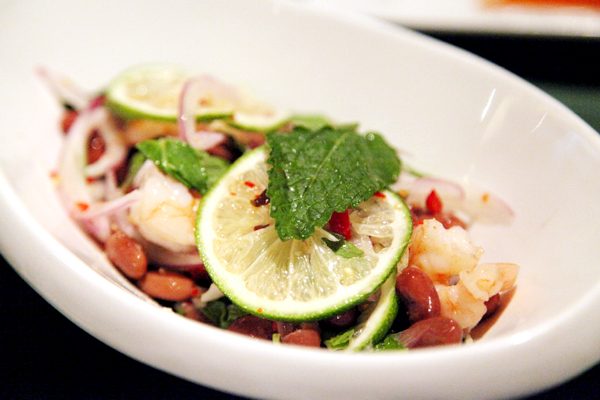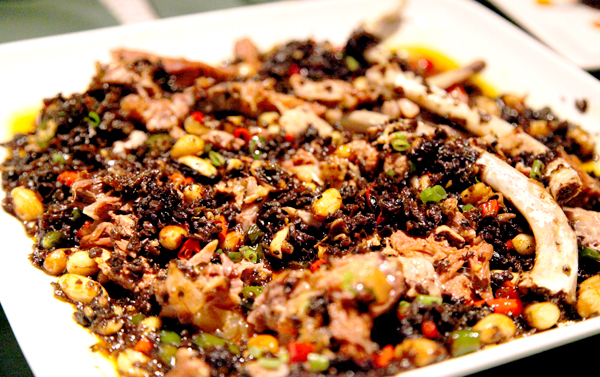A savory ride to China's southwest
 |
|
Cold prawns with lime and mint [Photo by Fan Zhen / China Daily] |
 |
|
Fried baby ribs [Photo by Fan Zhen/China Daily] |
A heap of succulent pork ribs smothered in a mixture of red and green fresh chilies, peanuts, and fermented bean sprouts and black beans. The whole party descends upon the dish, chopsticks swooping in on the mouth-watering meat that falls from the bone and elicits smiles of contentment as it is gobbled up.
When the meat has gone, spoons rake up the topping to be eaten with the plain rice. The meat is tender because it is steamed first and then lightly fried, creating wonderfully succulent morsels that have been almost caramelized by the hot oil. This is the star dish, the meaty dream that always brings customers back: the fried baby pork ribs at Southwest Ethnic Dishes.
Yunnan province is one of the most beautiful regions in China. This is where the Shangri-La is, the basis for the fictional heaven on Earth in Lost Horizon by British writer James Hilton. People flock to this region for its idyllic scenery and sprawling mountain ranges.
Located in the southwest region of China bordering Vietnam and Myanmar, Yunnan and nearby Guizhou provinces are known for ethnic diversity and food similar to that from neighboring Sichuan province. The food also has the tongue-numbing peppercorns and has generally got a touch of spiciness.
But it has its own characteristics. Since Yunnan has the greatest diversity of plant life in China, the place is endowed with abundant produce, such as precious wild mushrooms foraged from the mountains, fresh river fishes in the valleys and unique plants plucked from the countryside.
When the dishes come to the table, a taste journey begins as a visual adventure.
The colors of deep purple from the eggplant, the red of the chili oil, the dark fermented topping stacked upon country-style aubergine dish creates a modern twist on a Yunnan classic. Though it can be a bit oily, the eggplant flesh is soft while maintaining its shape, and the fermented vegetables on top make it distinctive and delicious.
Instead of the more common grilled goat's cheese, Southwest Ethnic serves its version of the dish deep-fried. This provides an interesting crunch, but denied us the gooey softness usually associated with the dish. The spicy dip, though, is a welcome change, the ground Sichuan peppercorns dancing on your tongue, melding with the subtle flavor of the goat cheese.
Fried rice with Yunnan black pickle is a favorite among diners - some order just this dish and dabao it for lunch. Our table sees why - it is fragrant, smoky, and spicy-salty. It is a tasty dish on its own, but as an accompaniment to other dishes it doesn't really work. Plain white rice will do the job of evening out the strong Yunnan flavors of the rest of the menu.
Arriving at our table heaped in a salad of lettuce, cucumbers, cherry tomatoes, Spanish onion and peanuts, is the Miao-style barbecued fish. Pushing the salad aside for later, we discover a beautiful piece of white fish, with minimal bones, in a tangy marinade. Watch out for the pieces of fresh chili though - or have a Dali beer at hand for a long sip in case of a coughing fit.
No need for caution when consuming the Yunnan mushrooms baked in banana leaves. This dish combines a gorgeous mixture of mushrooms, the textures and aromas blending with faint hints of chili and chive.
The mushrooms are cooked perfectly, neither soggy nor stiff. And unlike some other mushroom dishes, this one is not highly seasoned, allowing the pungent, earthy flavors of the fungi to surround your taste buds in what feels like a warm hug, straight from the fields of Yunnan.
You could eat at Southwest Ethnic Dishes a hundred times (and I think we might be nearing that territory), but the dishes can still surprise you. Whenever we eat here the chefs offer something different - sometimes subtle, and sometimes baffling, but never boring.
Related:
Beijing soup spot lives up to its name

















